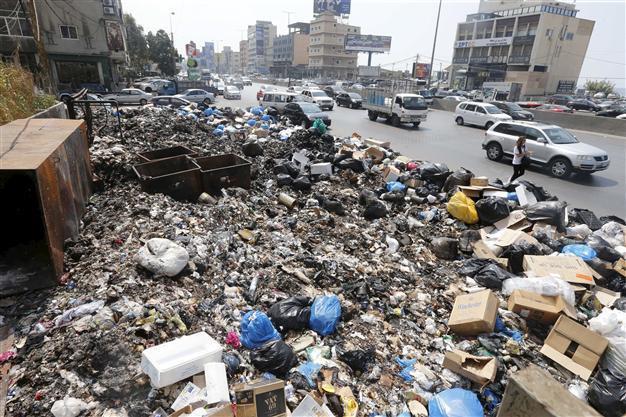Lebanon cabinet approves plan to end trash crisis
BEIRUT - Agence France-Presse

Garbage is piled along a highway in Beirut, Lebanon, September 3, 2015. Reuters Photo
Lebanon's cabinet on Sept.9 approved a plan to end a trash crisis that sparked unprecedented protests targeting the country's stagnant political class.
After a marathon emergency session, as protesters once again took to the streets in Beirut, Agriculture Minister Akram Shehayeb said a deal had been reached.
"Tonight the cabinet approved a path out of the crisis," he said, some six hours after the ministers began talks.
The plan incorporates a key demand of activists -- the decentralisation of waste management, with municipalities receiving funds to manage the issue locally.
But it also includes proposals that may be more controversial.
It envisions converting two existing dumps, in the northern Akkar region and the eastern border area, into sanitary landfills capable of receiving trash for more than a year.
It also seeks to temporarily reopen the Naameh landfill, the country's largest, which was closed in July, sparking the trash collection crisis.
Activists and residents of Akkar have strongly opposed the creation of a landfill there, and those living around Naameh have insisted the site will not be reopened for any reason.
Shehayeb countered that Naameh would be reopened for seven days only to allow disposal of waste that has piled up in Beirut and its surroundings.
With nowhere to take the garbage, it has been temporarily dumped in empty lots, on roadsides, mountainsides and in riverbeds.
The minister warned that collecting the trash before rains began was essential to avoid contamination.
Shehayeb said other sites including an old landfill outside Beirut and a waste treatment plant in southern Sidon would also be used under the plan.
Lebanon's waste crisis began in July, when the country's largest landfill Naameh closed without the government finding an alternative location.
As trash piled up in the streets, protesters began holding demonstrations that gradually expanded beyond the issue of garbage to take aim at the government's longstanding divisions and impotence.
Campaigns like "You Stink" brought thousands of people into the streets in unprecedented non-partisan and non-sectarian demonstrations against the entire political class.
Lebanon has been without a president for more than a year, with its divided parliament unable to elect a successor despite meeting more than two dozen times.
The cabinet has also been paralysed for months, and even the emergency session on Sept.9 was boycotted by some members.
Lebanon's political system is deeply divided between two main blocs.
One is led by the Shiite Hezbollah movement that is allied with Syria and backed by Iran, and the other is headed by Sunni former prime minister Saad Hariri, who is supported by Saudi Arabia and the West.
Earlier on Sept.9, the country's leading parties met for a "national dialogue" intended to address the political gridlock and particularly the presidential void.
But the session ended without any achievements, and a simple announcement that more talks would be held next week.
In central Beirut's Martyr's Square, hundreds of demonstrators had gathered by nightfall, condemning government corruption and dismissing the dialogue as farcical.
"This dialogue is a lie to the people," said Tarek Al-Maleh, an activist with "You Stink" who braved the protests despite a sandstorm that has blanketed the region and killed three people in Lebanon.
"They've besieged us as though we were in a military barracks and confined us to a single area, but we are here to stay," he said.
Samer Mazeh, a 23-year-old student, ridiculed the political dialogue.
"The dialogue only aims... to circumvent us," he told AFP.
"The trash crisis can be solved and there are many options available to countries around the world, but they don't want a solution because trash is a goldmine for them."
There was no immediate reaction from activists to the government's plan, but Shehayeb stressed that that environmentalists were consulted in drawing it up.
Experts have urged Lebanon to focus on recycling more waste, and composting organic material, saying that would vastly reduce the amount of trash going to landfills.
